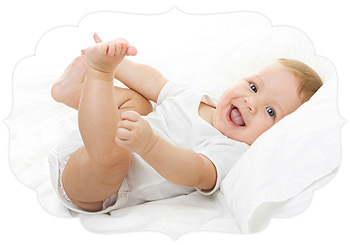Watch your baby grow. Keep this growth chart by your changing table, crib or rocking chair. Use it often by marking and dating the measurements and reviewing the important safety tips.
Bedroom
 Place your baby to sleep on his or her back on a firm, tightfitting mattress that fits well in a crib that meets current safety standards.
Place your baby to sleep on his or her back on a firm, tightfitting mattress that fits well in a crib that meets current safety standards.
Placing babies to sleep on pillows or folded quilts can result in death by suffocation.
Do not place pillows or thick quilts anywhere in a baby’s sleep environment due to the risk of suffocation.
Do not use any crib with missing, broken, or loose parts. Make sure to tighten hardware from time to time to keep the crib sturdy.
Never place baby’s crib near window blinds and curtain cords due to risk of strangulation.
Bathroom
Never, ever leave your child alone in a bathtub or near water even for a moment. Remember: bath seats or rings or other bathing aids are not safety devices.
Keep medicines and cleaning products with child resistant lids locked and out of reach of children.
Kitchen
Do not leave baby alone in a high chair and always use all safety straps.
Keep matches, lighters, knives, and cleaning products with child resistant lids, locked and out of reach of children.
Around the house
Use safety gates to block stairways and other dangerous areas. Avoid older gates that can collapse and entrap babies.
Keep all small objects, especially round objects such as balls and marbles, away from children. Keep older sibling’s toys out of reach of children under 3 years of age, especially magnets and balloons.
To avoid falls, secure windows with window guards.
Secure furniture to avoid tip-overs.
Install smoke and carbon monoxide alarms. Change batteries every year.
The Reasons Behind the Baby Safety Checklist
Bedroom
Always put your baby to sleep on his or her back because tummy sleeping increases the risk of Sudden Infant Death Syndrome (SIDS) and suffocation.
Never allow a gap larger than two fingers between the mattress and sides of the crib to prevent entrapment.
Cribs that are assembled wrong, have missing, loose or broken hardware or broken slats can result in entrapment or suffocation deaths. Infants can strangle when their head and neck become entrapped in gaps created by missing, loose or broken hardware or broken slats.
Placing babies to sleep on pillows can result in death by suffocation.
Children have strangled on inner and outer cords on blinds and window treatments. Keep cribs away from windows and cords of any type.
Bathroom
Never, ever, leave your child alone or under the supervision of a sibling in bathtub or near any water. Children can drown in only a few inches of water in seconds.
Keep medicines and cleaning products with child resistant lids locked. Child resistant is not “child proof.”
Kitchen
Do not leave baby alone in a high chair and always use all safety straps. This will prevent injuries and deaths from the baby climbing out or from falling through leg openings.
Keep matches, lighters, and knives, and cleaning products with child resistant lids, locked and out of reach of children to reduce risk of fire, poisoning, and other injuries.
Do not place your baby in any child or infant seat, including car seat carriers, infant carriers, bouncers, vibrating seats, or unsecured booster type chairs, on a countertop, table or any elevated surface. The baby’s movements can cause the seat to fall, resulting in head or other injuries.
Around the house
Keep small objects, especially spherical toys such as marbles and objects with rounded ends away from children. These objects present a very high risk of choking.
Keep toys with magnets away from young children. If two or more magnets are swallowed they can attract through intestinal walls and can cause holes, blockage, and infection which can result in death.
If swallowed, un-inflated balloons and balloon pieces can lead to death by clinging to the airways.
Children have died when furniture tipped over on them. Secure furniture with anchors to the wall or floor.
Install smoke alarms on each level of your home, outside sleeping areas, and inside each bedroom. Install carbon monoxide alarms outside sleeping areas.
U.S. Consumer Product Safety Commission - Go to www.cpsc.gov to check for recalled products and sign up for automatic e-mail recall notifications.
